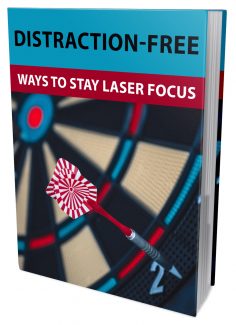 License Type: Master Resell Rights
License Type: Master Resell Rights  File Type: ZIP
File Type: ZIP
 SKU: 63945
SKU: 63945  Shipping: Online Download
Shipping: Online Download
Sample Content Preview
Introduction
There is plenty of advice available on how to increase your performance. One of the least talked about is the need for improved focus. You could call focus the secret ingredient to success. We face distractions every day. Our environment is filled with abundant stimuli, all vying for our attention and ensuring that we will lose focus and have difficulty in concentrating. These distractions make it difficult for us to perform at our optimal level.
Mental focus is the deliberate and conscious effort of keeping a mental spotlight on what we are doing. We block out distractions and hone in on what is important. However, that is not always easy. The problem with not focusing properly is not only that we feel out-of-control, but we experience a constant high level of stress, which can affect our health.
For many, trying to maintain concentration is a daily chore with which they struggle. If we want to succeed, we need to improve our focus, and luckily, that is skill that can be learned and enhanced. The fact is, we have only so much mental energy to spare. It’s a finite commodity. As that energy gets scattered in many directions, our brain simply rebels, as our body does when we expend too much physical energy.
The ability to focus on one task becomes lost. That’s when we become stressed. Frequently, our ability to focus is directly related to our emotions. If a task – at work or at home – makes us nervous or anxious, we actively seek distractions. If a report the boss is waiting for fills us with panic, it’s easier to divert our attention to checking email, making phone calls or chatting with someone at the water cooler than to concentrate on the report.
At home, when a serious discussion with a spouse is necessary, we may welcome the distraction of Facebook, Twitter and ESPN rather than face the unpleasantness ahead. We may not do this consciously, but there are times we certainly choose to invite distractions to keep us from focusing on something that is important. And as a consequence, our work and relationships suffer.
We will discuss how to keep a better balance between positive and negative thoughts and how to creative habits that help us develop a better focus on a daily basis. The good news is, focusing is not only a skill we can learn, it is also a choice we can make. This book is designed to help us make better choices to enable us to focus better.
Why We Need To Focus
Being in focus is a purposeful direction and control of our awareness to the present moment, where it is most needed. Never has this been more important than today, when there is such an abundance of ready distractions competing for our attention. So many of us feel anxious if we aren’t checking Facebook updates, Twitter notifications and emails every few minutes. Unfortunately, this has turned into a chosen lifestyle for many. Our smartphone has become our lifeline.
We’re on the phone while driving and posting on Instagram while grabbing a meal. Instead of focusing on what we are doing, we take pride in “multitasking.” The problem with multitasking is that it doesn’t allow us to do more, it merely dilutes and diminishes what we are already doing.
The good news is, our brain, like our body, can be enhanced and developed. And like our bodies, this takes patience, time and effort. It won’t happen overnight, but it will happen. Building our muscles is the results of daily habits, and the brain is a muscle. We can train ourselves to improve our focusing power and perform better until it becomes natural and second nature. The better we become at focusing, the better we are able to control our thoughts and our actions.
Does mental chaos seem natural to you, like a car battling heavy traffic every day? Do you wonder how some people manage to get more done and do it quicker and better? These people face the same focusing obstacles we all do. Everyone does. They have merely trained themselves to overcome it instead of remaining a victim to information and anxiety overload.
Computers allow information to be processed at a speed that would have been unimaginable just decades ago. They have changed our lives. Unfortunately, our brains are still working at the same pace. That’s why we are suffering from circuit overload. In effect, some of us exist in a perpetual mental traffic jam.
The more information we have, the harder we are forced to work. Some days, it can seem that we are controlled by our computers and social media instead of us controlling them. While we are constantly being interrupted by emails, tweets, texts and coworkers in the next cubicle, our own mind can add to the dissonance as we try to focus on our work while our brain keeps replaying some painful past incident and other thoughts irrelevant to the present.
It’s time we set sound mental boundaries. We’ve allowed our brain to run amok, and it’s time to take back control. Sometimes, taking control of our mental focus is a simple as learning to say no. There are a lot of demands on our time. We are led to believe that doing more is the road to success, when in reality, it can lead to unfocused confusion. We need to actively and carefully choose on what we concentrate. A lot of times that means doing less, but doing it better.
If you’re worried about paying the bills and an important report is due at work, you cannot focus on both and give the problems equal attention. If a loved one is facing serious health issues, and your thoughts are on getting a new job, you need to choose what is more important.
Making these critical choices starts with awareness. It’s easy to push negative thoughts and emotions away and pretend they don’t exist. But those thoughts will remain in your brain, creating havoc with your ability to concentrate. The easiest way to handle these choices is by acknowledging them and saying, “I will think about this matter later and focus on what’s really important now.” This is setting a conscious boundary in your mind. The problem still exists, but by making a choice, it no longer serves as a distraction. Practicing mindfulness, as discussed in the following chapter, is a great help in accomplishing this.
Not all focusing problems are that clear. Every day, we face dozens, if not hundreds of distractions. At the office, we may consider it necessary to check email every half hour, talk to anyone who comes into our office, and agree to take on any task we are given. Business seems to demand multitasking in order to achieve greater productivity. In reality, we are still doing one task at a time, but are shifting back and forth and devoting less attention to all tasks. We are focusing less, when we should be focusing better.
- License: Master Resell Rights
- Category:Ebooks
- Tags:2021 Ebooks With Audio Master Resale Rights








